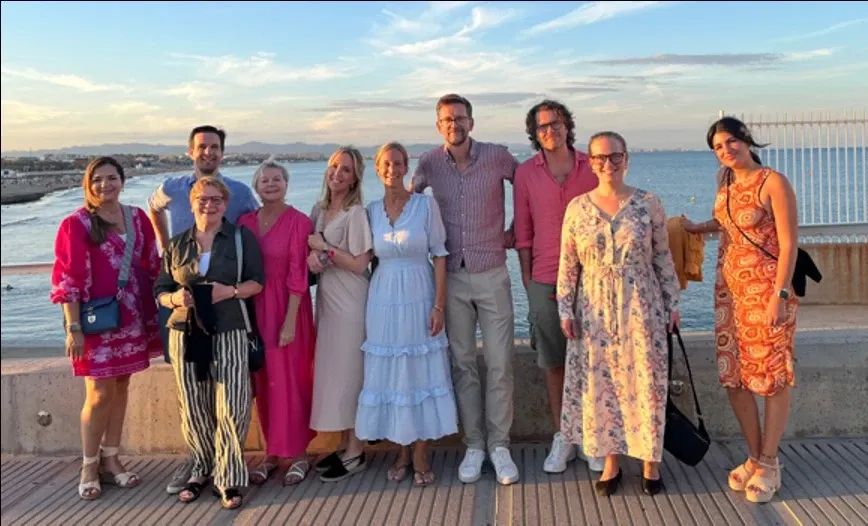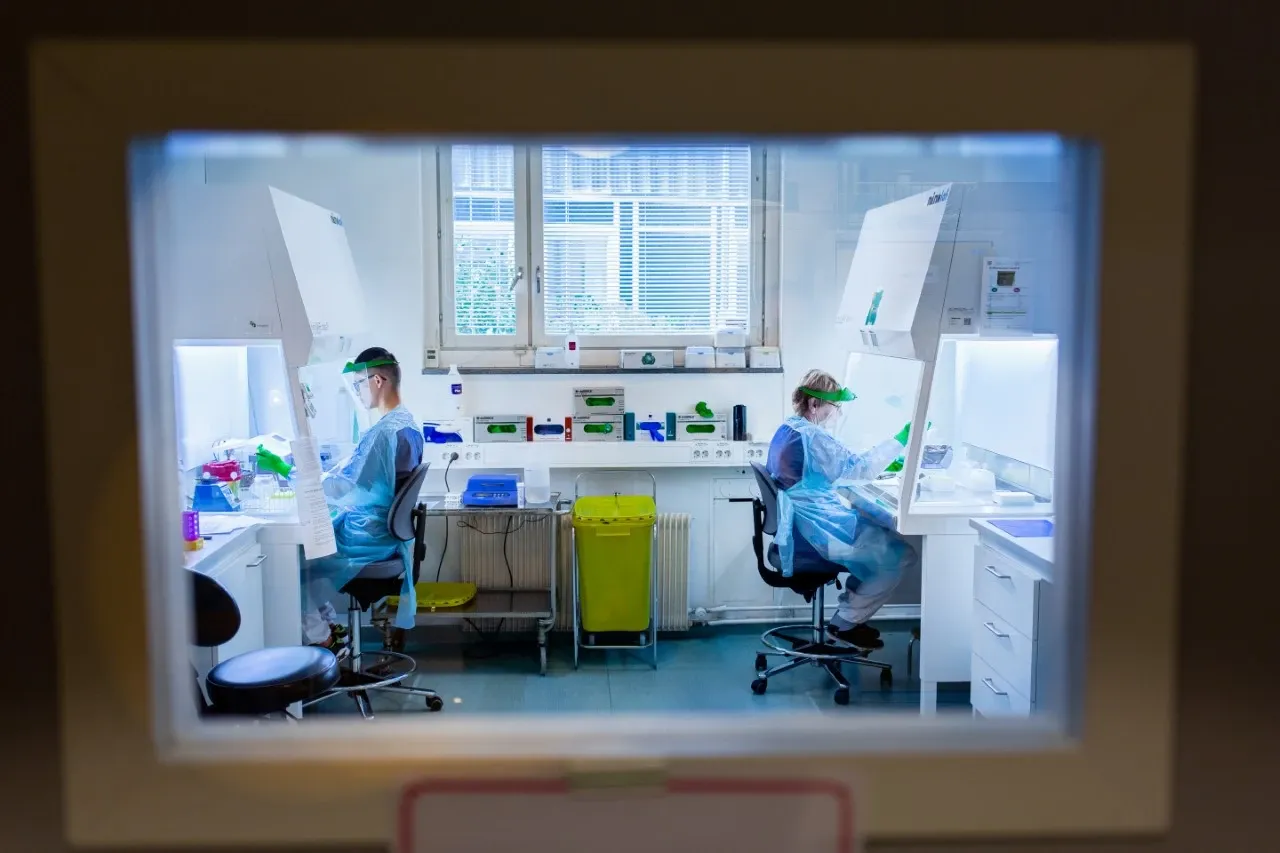
Our research
Our research group is engaged in both clinical, basic and translational research and our interests span across mucosal immunity to the exploration of cancer biomarkers. Our team divides current focus between two distinct aims: a deeper understanding of the role of secretory IgA in respiratory mucosal immunity and the discovery of biomarkers predicting an occult cancer in high-risk populations. To achieve these goals, we lead two clinical cohort studies; MEDECA and COMMUNITY, and in 2024, we launched the D/T-MAP project: Dissecting and Translating the Functional Role of Mucosal IgA Glycoprofiles for Effective Humoral Mucosal Protection.
Our research is deeply rooted in a translational framework, with our unique clinical biobanks at its core. Blood and respiratory samples are collected at Danderyd Hospital and processed and stored at Kliniskt Forskningscentrum (KFC)—a research infrastructure embedded within Danderyd Hospital. This close clinical integration enables efficient sample handling and fosters a true bedside-to-bench-and-back approach. By integrating clinical sciences with translational methods and interdisciplinary collaborations, we conduct innovative, patient-centered research. Our lab integrates techniques such as flow cytometry, ELISA, qPCR, and in vitro cell-based assays and we have established a dedicated human adult stem cell (hASC) organoid platform to study airway immunity in physiologically relevant tissue models.
D/T-MAP
D/T-MAP (Dissecting and Translating the Functional Role of Mucosal IgA Glycoprofiles for Effective Humoral Mucosal Protection)
Current lack of effective measures to prevent respiratory viral infection and spread is a global challenge to society. Secretory IgA in the respiratory mucosa provides broad protection against respiratory infections, but investigations into humoral immunity have predominantly focused on circulating antibodies, particularly those of the IgG isotype. In the D/T-MAP project, we address this knowledge gap by striving for a deeper understanding of the role of secretory IgA proteoforms in conveying effective immune protection at the respiratory mucosa. Taking advantage of our human nasal secretion biobank (COMMUNITY biobank) and recent advances in liquid chromatography and mass spectrometry (LC-MS), we aim for a molecular-level characterization of protective mucosal IgA, including site-specific glycosylation profiles. We will link mucosal IgA structures to in vivo protection by mapping them to our biobanked samples with predefined correlates to protection against infection. The insights gained from this detailed characterization will guide the glycoengineering of efficacious recombinant IgA candidate molecules, which will be evaluated for their capacity to safely block infection on our human adult stem cell (hASC) nasal and lung organoids closely replicating human airways. By replacing animal models with physiologically relevant human-based systems we hope to study the secretory IgA system in a way that has not been possible before, to pinpoint IgA candidates that are most likely to succeed in human, and to accelerate the path to clinical trials.
D/T-MAP is funded by the European Research Council (ERC Starting Grant), Knut and Alice Wallenberg Foundation (KAW Project Grant) and Svenska Sällskapet för Medicinsk forskning (SSMF Consolidator Grant) and conducted in close collaboration with KTH (Sophia Hober), Uppsala Universitet (Mikael Åberg), Leiden University Medical Center (Manfred Wuhrer), Utrecht University (Gestur Vidarsson), Linköping University (Jonas Klingström) and Umeå University (Mattias Forsell).
COMMUNITY
The COMMUNITY study (Covid-19 Immunity)
Driven by the covid-19 pandemic, we initiated the COMMUNITY study in April 2020, now comprising a longitudinal cohort including 2149 healthcare workers and 118 hospitalized COVID-19 patients. The overall aim is to explore systemic and mucosal antibody responses to respiratory viral infections and vaccines. Blood and airway samples are collected every four months, and clinical data are mapped by continuous data collection through a smart-phone app system and national registers. qPCR screening programs detecting mild and asymptomatic infections are conducted during seasonal periods with high viral spread. Key findings include the power of hybrid immunity (i.e. combination of infection and vaccine induced immunity) and the role of secretory IgA in protection against respiratory infections. The biobank now comprises >60.000 paired serum and mucosal samples and is the base of the D/T-MAP project where we aim to link secretory IgA structure to function and protection against respiratory infections.
The COMMUNITY study is funded by Knut and Alice Wallenberg Foundation/SciLifeLab, Region Stockholm, Hjärt-Lungfonden, Jonas and Christina af Jochnick Foundation, Familjen Lundblad, Jonas Söderquists stipendiestiftelse and the National Institute of Health (NIH) and conducted in collaboration with Uppsala University (Mikael Åberg), KTH (Sophia Hober and Peter Nilsson), National Pandemic Center at Karolinska Institutet (Jessica Alm), the National University of Singapore (Youjia Zhong), and the Icahn School of Medicine at Mount Sinai New York (Florian Krammer and Viviana Simon).
MEDECA
The MEDECA study (Markers in Early Detection of Cancer)
Early diagnosis of cancer is key for improving patient outcomes, but cancers are difficult to diagnose if patients present with unspecific symptoms. The principal objective of MEDECA is to identify a multi-analyte blood test that can detect and map occult cancer within a mixed population of patients presenting with serious but unspecific symptoms. We are including 1.500 patients referred to the Diagnostic Center at Danderyd Hospital (DC DS), a multidisciplinary diagnostic center referral pathway for patients with radiological findings suggestive of metastasis without known primary tumor or suspicion of serious but unspecific symptoms. Blood samples are collected prior to a standardized and extensive cancer diagnostic work-up, including a wide range of biochemical analyses and extensive imaging such as computed tomography or magnetic resonance investigations. In collaboration with world-leading national and international scientists, the blood samples are analyzed for a panel of novel and established blood biomarkers predictive of an underlying cancer, including markers of neutrophil extracellular traps (NETs), circulating tumor DNA (ctDNA), affinity-based proteomics, nuclear magnetic resonance (NMR) metabolomics and whole blood N-glycomics. The diagnostic accuracy of the blood biomarkers with respect to cancer detection during the diagnostic work-up are analyzed through machine learning.
MEDECA is funded by Region Stockholm, The Swedish Research Council, ALF Medicin, Svenska Läkarsällskapet and Stitching af Jochnick Foundation, and conducted in collaboration with Uppsala University (Mikael Åberg), Leiden University Medical Center (Manfred Wuhrer), University of Oxford (Fay Probert) and University of North Carolina at Chapel Hill (Nigel Mackman).
Collaborations
Our work is strengthened by close collaborations with globally leading scientists with complementary expertise spanning molecular biotechnology, proteomics, glycomics, virology, immunology and vaccinology:
Sophia Hober, Professor of Molecular Biotechnology at KTH
Peter Nilsson, Professor of Proteomics, KTH
Mikael Åberg, Associate Professor Uppsala University and head of the Unit of Affinity Proteomics SciLifeLab Uppsala
Jonas Klingström, Professor of Virology at Linköping University
Jessica Alm, PhD, Strategic Process Leader Defence-Related Medicine, Head of Unit National Pandemic Center, Karolinska Institutet
Mattias Forsell, Professor of Immunology at Umeå Universitet
Nigel Mackman, Professor of hematology at the University of North Carolina at Chapel Hill
Manfred Wuhrer, professor of Proteomics and Glycomics and head of the Center for Proteomics and Metabolomics of the Leiden University Medical Center (LUMC)
Gestur Vidarsson, Professor in Biomolecular Mass Spectrometry and Proteomics at Utrecht University
Fay Probert, PhD, Dorothy Hodgkin Career Development Fellow at the University of Oxford
Youjia Zhong, Associate professor in clinical immunology at the National University of Singapore
Viviana Simon, Professor in Microbiology and Virology at the Icahn School of Medicine at Mount Sinai New York
Florian Krammer, Professor of Vaccinology at the Icahn School of Medicine at Mount Sinai New York
Open positions
We welcome applications from motivated and talented postdoctoral researchers interested in mucosal immunology. For inquiries, please contact Group Leader Charlotte Thålin: charlotte.thalin@ki.se

